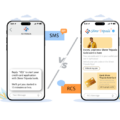Whether you’re a freelance designer, YouTube creator, or ecommerce seller, managing your income isn’t always straightforward. You may get paid in chunks from multiple sources, earn royalties from creative work, or hire independent contractors to help you grow. All of this needs to be tracked—not just for your own awareness, but to stay in compliance with tax laws.

That’s where online bookkeeping software can make a big difference. It helps automate the messy parts of financial management, from tracking royalties to preparing 1099 forms. For small businesses and creators juggling multiple income streams, it’s one of the most practical tools you can use. In this article, we’ll look at how modern bookkeeping platforms can help creative and ecommerce businesses stay organized and ready for tax season.
Why Creators and Ecommerce Sellers Need Bookkeeping Support
Creators and ecommerce business owners often deal with more financial complexity than a typical freelancer or local service provider. Some common elements that can easily trip up creators include:
- Receiving royalties or licensing fees at irregular intervals
- Income streams from platforms like Etsy, YouTube, Gumroad, Patreon, or Shopify
- Working with remote contractors or collaborators who require 1099 forms
- Tracking product inventory, digital sales, and subscription revenue
All of this adds up to a workload that’s difficult—and risky—to manage manually. Online bookkeeping tools are built to handle this variety and complexity, with features that categorize income and expenses automatically and generate accurate reports for taxes and planning.
Tracking Royalties and Platform Payments
If you earn royalties from published work, music, or digital products, keeping clean records is essential. Royalty income can vary in amount and frequency and is sometimes delayed by weeks or months after a sale occurs. It can also come from multiple sources and be split across territories or currencies.
Bookkeeping software allows you to:
- Link your accounts from platforms like Amazon KDP, Bandcamp, or Shutterstock
- Record royalty income automatically or manually, tagging it as passive income or licensing revenue
- Split payments by source and date, which helps with reconciling income reports
Ecommerce sellers face similar issues, especially if they’re receiving payouts from multiple storefronts or payment gateways. By connecting accounts from PayPal, Stripe, or Shopify, you can track payments accurately and avoid counting the same income twice.
Managing Payments to Freelancers and Contractors
Growing your business often means bringing in outside help, from video editors and product photographers to virtual assistants or ad managers. If they’re not W-2 employees, they’re considered independent contractors. That means you’re responsible for issuing a 1099-NEC form if you paid them $600 or more during the year.
Bookkeeping platforms help by:
- Tracking payments by recipient
- Storing contractor details like name, address, and taxpayer ID
- Summarizing payments over the course of the year
- Generating 1099 forms based on your payment records
- Exporting data so you can easily file your 1099 online
Some platforms even integrate directly with 1099 e-filing services, so you can prepare and send the forms from the same dashboard where you track your expenses.
Simplifying Quarterly Tax Estimates
If you don’t have taxes automatically withheld from your income, as is often the case for creators and small business owners, you’re responsible for paying estimated taxes to the IRS each quarter. Falling behind on these payments can result in penalties and surprise tax bills.
Bookkeeping software helps business owners stay on track by presenting a clear, up-to-date picture of their income and expenses. With accurate records, you can:
- Monitor how much income you’ve actually earned each quarter
- Subtract deductible expenses to estimate your taxable income
- Calculate how much you owe before the next payment deadline
Some platforms also include built-in tools or reminders to help you schedule and submit your estimated payments on time, reducing the risk of underpayment penalties.
Keeping Track of Deductible Expenses
Accurately tracking business expenses throughout the year is key to reducing your tax bill and avoiding missed deductions. For creators and ecommerce sellers, common deductible business expenses can include:
- Equipment and software
- Marketing and ad spend
- Internet and phone bills (business portion)
- Shipping supplies and postage
- Professional services like legal or design help
- Home office expenses
- Education and training related to your business
Most online bookkeeping software allows you to categorize expenses, attach receipts, and keep everything organized for tax prep or audits. Staying consistent with your recordkeeping makes it easier to maximize deductions and reduces stress when it’s time to file.
Syncing With the Tools You Already Use
The best bookkeeping solutions for creators and small businesses are the ones that integrate with the tools and platforms you already use. This might include:
- Payment processors (PayPal, Stripe, Square)
- Selling platforms (Etsy, Shopify, Amazon)
- Banks and credit cards
- Invoicing tools
- Payroll or contractor management services
These integrations reduce manual data entry and allow you to view your financial data in one central dashboard. That’s particularly helpful when you’re dealing with multiple income streams and trying to get a full picture of your business’s performance.
Getting Ready for Filing Season
Even with good records, tax season can be stressful. Many small businesses and creators have royalties, digital sales, and contractor payments that all need to be reported correctly. Bookkeeping software can make this easier by preparing key information such as:
- Income statements
- Year-end summaries of income by platform or client
- Expense breakdowns by category
- Contractor payment reports for 1099 filing
- Reconciled bank statements and transaction logs
Having these documents ready will save time whether you file your taxes yourself or work with a professional.
For many creative and ecommerce businesses, dealing with complex bookkeeping tasks like royalties to contractor payments is an unavoidable fact of life. A good bookkeeping system simplifies the process, reduces manual work, and helps you stay focused on growing your business.













